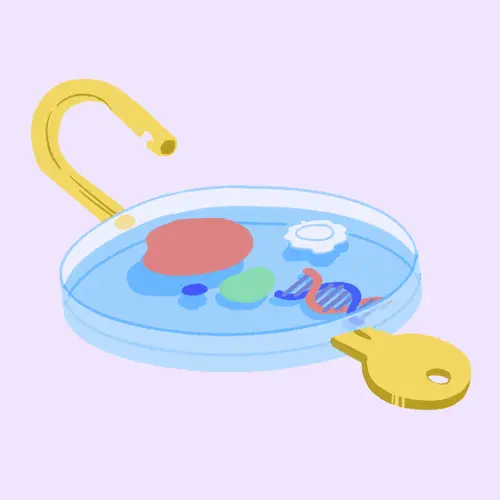Have you ever taken a bite from an apple and felt your mouth get itchy? Did a tasty banana cause your tongue to swell? If so, chances are you have oral allergy syndrome, or pollen-food allergy syndrome as it’s also known. It happens because your immune system can’t tell the difference between proteins in these foods and pollen. The symptoms are usually itching, tingling, and swelling, mostly to the mouth, lips, and throat.
You Can Have It and Not Know It
Oral allergy syndrome is common, says Robert Eitches, MD, attending physician at Cedars-Sinai Medical Center. He says he has about 500 patients who have it.
But many who have it don’t know they do. A lot of people with pollen allergies know they can’t tolerate these foods, but they don’t make the connection between them and their allergies, he says.
People find out when their allergy testing is negative for foods but positive for something like birch pollen, grass pollen, or ragweed pollen, Eitches says.
"We’re just learning about the syndrome over the last 5 or 10 years," Eitches says. "I think it’s been around longer than we realized. It’s become more obvious in the last 2 or 3 years."
Who Gets It?
Oral allergy syndrome mostly affects teens and adults, though younger children sometimes get it, too.
In most cases the reactions are mild and don’t last long. Symptoms usually show up right after you eat. But it could take up to an hour.
What If My Reactions Are Severe?
Treat it like a pollen allergy. Antihistamines, epinephrine (for severe reactions) and immunotherapy are three courses of action. But there isn’t a specific medication to treat oral allergy syndrome.
In rare cases, it can cause a life-threatening reaction known as anaphylaxis. Symptoms may include:
Call 911 if you have any of these signs.
Your doctor can tell you if you’re at risk for anaphylaxis. They may prescribe an epinephrine auto-injector.
Talk to your doctor if your symptoms don’t go away. It’s always best to ask your doctor or allergist. Skin tests and food challenges can help you find out how serious your allergy is.
Foods to Watch Out For
So you have seasonal allergies and want to know what other foods, known as trigger foods, may cause your allergies to worsen.
If you have a birch allergy, the list of potential triggers for oral allergy syndrome includes:
- Almonds
- Apples
- Apricots
- Carrots
- Coriander
- Celery
- Cherries
- Fennel
- Hazelnuts
- Kiwi
- Nectarines
- Parsnips
- Peaches
- Pears
- Peppers
- Plums
Birch is probably the biggest cause of cross-reactions, Eitches says. Kiwi, celery, nectarines, apricots, and apples are the most common trigger foods.
If you have a ragweed allergy, you may have to avoid:
- Bananas
- Cantaloupe
- Chamomile tea
- Cucumber
- Honeydew
- Watermelon
- Sunflower seeds
- Zucchini
If grass is your allergy, these might cause a reaction:
- Celery
- Cantaloupe
- Honeydew
- Oranges
- Peaches
- Tomatoes
- Watermelon
If mugwort is troublesome for you, then any of these may cause you problems:
- Apples
- Bell peppers
- Black pepper
- Broccoli
- Cabbage
- Caraway
- Carrots
- Celery
- Coriander
- Fennel
- Kiwi
- Parsley
- Peanut
- Sunflower
Latex allergies mean the following foods could cause a reaction:
- Avocadoes
- Bananas
- Chestnuts
- Kiwi
- Papaya
Eating any of the trigger foods should cause a similar reaction every time, says Mary Tobin, MD, associate chair for clinical programs at Rush University Medical Center.
But it could be worse if you eat the food during the height of pollen season, she adds. Not all foods associated with one of the pollens will trigger a reaction.
You may only have problems with one or two foods, Tobin says. Bananas and cantaloupe could set you off, but eggplant and squash might not bother you.
Only foods that come from plants can cause oral allergy syndrome. If nuts are your problem, you may have a more serious food allergy. Talk to your doctor.
Do I Have to Cut Out Those Yummy Foods?
The surest way to avoid oral allergy syndrome is to steer clear of trigger foods. Still, there are ways to eat your favorite fruits and vegetables and keep your risk to a minimum.
The best way is to cook your food. Heat breaks down the proteins associated with the syndrome. But this doesn’t work with all foods, like celery for example.
Canned, processed, pasteurized, or frozen foods may also be safe. But you may still have symptoms after eating dried or dehydrated foods.
If you still want to eat your fruit or vegetable fresh, try peeling it. Most of the proteins you want to avoid are in the skin.
All of this will drop your chances of getting the syndrome. But nothing will make it go away completely.
Still, if you know you have this problem, you can avoid those foods and live a happier, healthier life, Eitches says.

